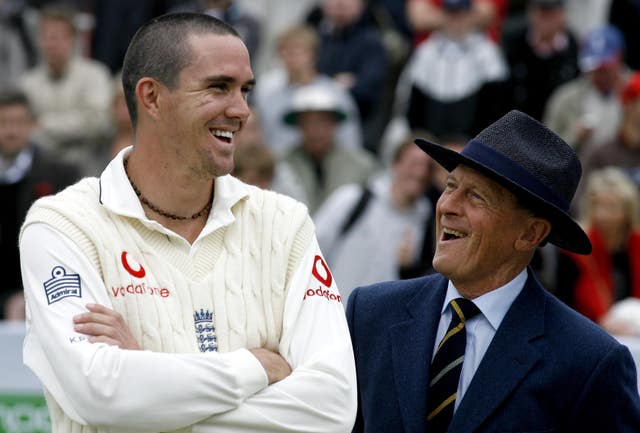There is no 'corridor of uncertainty' about Geoffrey Boycott – he is simply one of the world's greatest ever batsmen.
To many among a younger generation of cricket lovers he is fondly known for his no-nonsense TV and radio commentaries, and catalogue of typically-Yorkshire pithy put-downs such as 'my grandmother could have caught that in her pinny'.
But to aficionados of the sport over a certain age, he is first and foremost a stubborn and prolific batsman who is rarely far from his next controversy.
The 78-year-old, who has been awarded a knighthood in former Prime Minister Theresa May's resignation honours, opened the batting for England and his native county throughout the 1960s, 1970s and into the early 1980s.
Ready for another day in paradise @cricketon5 pic.twitter.com/0WqpOM4wct
— Geoffrey Boycott (@GeoffreyBoycott) May 29, 2017
But it is more than his record-breaking 48,426 first-class runs that has earned him a reputation to extend far beyond his chosen sport, deep into the public consciousness.
After a career which brought 108 Test caps between 1964 and 1982, he has transported his pithy opinions behind the microphone – chiefly for the BBC and Channel 5 – to unpick the efforts of subsequent generations.
As a cricketer, Boycott was notoriously risk-averse – he was dropped by England for slow scoring after making a career-best 246 not out against India on his home ground at Leeds in 1967 – but as commentator and summariser, he is the opposite.
The same stubbornness appeared to lie behind both styles.

At the crease, he steadfastly refused to even attempt the shots which might bring any element of danger, so determined was he to bat for as long as possible at every opportunity.
On air, the embodiment many thought of his plain-speaking industrial Yorkshire roots, he refuses to dilute the expert opinion he knows is the right one.
He finished his first-class career with an average of 56.83, placing him undoubtedly among the all-time greats, having become the first English Test batsman to exceed 8,000 runs.
He made 22 Test centuries, putting him joint top of England's list for the next 30 years alongside Wally Hammond and Colin Cowdrey – and the nation was never more transfixed than when he bestrode Headingley again, choosing Test cricket's centre stage to make his 100th first-class hundred before his largely adoring public in 1977.
That moment in time, completed with a trademark on-driven boundary off Australia captain Greg Chappell, came in just his second match back in the fold after a self-imposed three-year exile.
Love him or hate him, it is nigh on impossible to ignore Boycott.
The same is true in his reinvention as a pundit, repetition of those homespun phrases ensuring imitation by cricket followers around the world.
Millions play 'Boycott Bingo' from their living rooms, waiting to be told about those famously safe hands his grandmother had, or even better for others, that the man himself would have hit the last delivery for four 'wi' a stick o' rhubarb'.
Boycott was born, in fact, around 10 miles to the south of the fecund fields in West Yorkshire's Rhubarb Triangle, in the mining village of Fitzwilliam in 1940.
At the age of seven, a chest injury suffered after falling on a mangle in a neighbour's garden cost him his spleen.
But neither that nor the discovery that he was significantly short-sighted prevented him excelling at cricket especially, football – he played for Leeds juniors as a teenager – and cross-country.
It was at Barnsley Cricket Club that Boycott first met two other youngsters with fame stretching ahead of them, Dickie Bird who would play for Yorkshire and go on to become his sport's best-known umpire and also journalist and broadcaster Michael Parkinson.
His outstanding ability, and plain speaking, brought a level of fame known to few – in the same contemporary bracket from British sport, his great friend Brian Clough was a comparable transcendent force as the charismatic genius of football management.
For Boycott, retirement has not hindered profile – but there are two notable personal battles.
He fought unsuccessfully to clear his name on an assault charge brought in a French court by former girlfriend Margaret Moore in 1998.

It was a conviction he strenuously denied but one which resulted in dismissal by British-based broadcasters and press, who did not relent for several years.
In 2002, the stakes were higher still after he was diagnosed with throat cancer, from which he recovered, defying the statistics with the support of his partner Rachel Swinglehurst, whom he then married.
Boycott returned too to the commentary box, where he is happy to play many more shots than he had dared in the middle.
There was the occasional mishap, including his earthy description of South Africa all-rounder Ryan McLaren in 2009, uttered when he thought he was off air but resulting in a BBC apology.
Unequivocally nonetheless, Boycott's critiques are a long-standing hit with listeners and viewers.
Recognition has come in many forms. There was an OBE, in 1982, and it was barely a surprise to English eyes in the mid-1980s – though doubtless bemused some other nationalities – when Boycott was spotted in foot-high letters painted in bright red on the graffiti-laden western side of the Berlin Wall.
Closer to home, he was proud with endorsement at last from the Headingley establishment when he was made Yorkshire president from 2012-14, a tenure which spanned the club's 150th anniversary.
By then, he had long acquired among his nicknames the abbreviation GLY – the 'Greatest Living Yorkshireman' – maybe not to everyone but to many within his county and beyond.
And now Boycott has another title to add to his collection.
/https%3A%2F%2Fsportsmole-media-prod.s3.gra.io.cloud.ovh.net%2F19%2F19%2Fgeoffrey-boycott.jpg)
/https%3A%2F%2Fsportsmole-media-prod.s3.gra.io.cloud.ovh.net%2Fuploads%2F2025%2F11%2Fstokes-1-690694aa79b06297685297.jpg)
/https%3A%2F%2Fsportsmole-media-prod.s3.gra.io.cloud.ovh.net%2Fuploads%2F2025%2F07%2Fimago1064533006-6889f0b32d896043262124.jpg)
/https%3A%2F%2Fsportsmole-media-prod.s3.gra.io.cloud.ovh.net%2Fuploads%2F2025%2F11%2Fimago1069426574-6921890c1fa15979871066.jpg)
/https%3A%2F%2Fsportsmole-media-prod.s3.gra.io.cloud.ovh.net%2Fuploads%2F2025%2F11%2Fimago1069398963-69203b57b0924331078033.jpg)